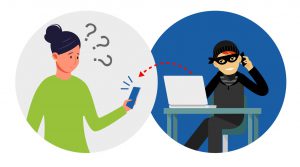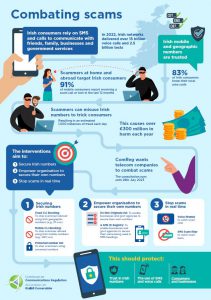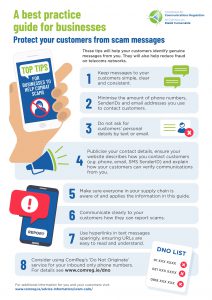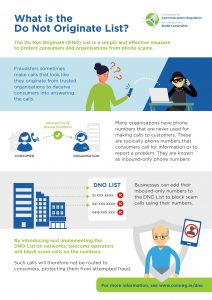Nuisance Communications
Nuisance Communications – Scam Calls and Text Messages
ComReg is actively working with the telecoms industry to mitigate the scourge of scam texts and calls in Ireland. Since early 2022, ComReg and the telecoms industry have been working together to restore trust in our telecommunications.
Nuisance communications are not unique to Ireland – it is a global problem and ComReg is engaging and collaborating with other regulators, both within the EU and further afield to develop ways to combat nuisance communications, particularly with those in the anglosphere. This is because, as an English-speaking country, Irish residents are targeted disproportionately compared with their EU counterparts as fraudsters can move seamlessly between other English-speaking countries, focusing their resources on countries where scams are more likely to have the highest success rate. It is inevitable that fraudsters will continue to target and commit more fraud in countries that lack adequate protection and English-speaking countries such as Ireland are likely to experience this the most.
On 16 June, 2023 ComReg published its consultation on combatting scam calls and texts. Research commissioned by ComReg shows that in 2022 alone in Ireland there were:
- approximately 365,000 cases of fraud as result of scam calls and texts, (or 1,000 cases a day)
- up to 89 million annoying/irritating communications and 31 million distressing communications.
- over 5,000 businesses that were the victim of fraud after receiving scam calls and texts
Overall, the total quantifiable harm to society arising is conservatively estimated at circa €309 million per annum.
ComReg is proposing that telecommunications operators implement a number of technical interventions to combat scam calls and texts:
- Fixed CLI Blocking: To stop fraudsters abroad spoofing Irish geographic numbers (e.g., 01-xx) to make scam voice calls.
- Mobile CLI Blocking: To stop fraudsters abroad spoofing Irish mobile numbers (e.g., 087-xx) to make scam voice calls.
- A Protected number list: To stop fraudsters using numbers that are not yet in service or have yet to be allocated to a telecoms operator prior to entering service.
- Do-Not-Originate list: Allows businesses/organisations to secure their numbers by blocking those numbers not used to contact consumers.
- A SMS ID Registry: Allows businesses/organisations to register a SMS Sender ID while blocking those that are not on the Register.
- Voice-firewall: To block spam calls wherever they arise (Ireland or abroad) and protect against future more sophisticated scams.
ComReg also assessed a SMS Scam Filter to block scam SMS and protect against future more sophisticated scams but this will require supporting legislation prior to introduction.
The overall benefit s from the interventions would be in the order of €1.5 billion over the coming seven years. The benefits to society for each euro spent on the interventions is substantial and should bring €50 in economic and social benefit for every €1 spent.
ComReg’s consultation and supporting documents are linked below:
ComReg’s other publications regarding nuisance communications include:
- IN 23/47 Nuisance Communications: CLI Call Blocking Update. Published 24/05/2023
- IN 23/28R Nuisance Communications: Do Not Originate Service Update. Published 27/03/2023
- IN 23/12 NCIT New Terms of Reference. Published 10/02/2023
- IN 23/01 Nuisance Communications: Scam Calls & Texts – Best Practice Guide for Businesses and Organisations. Published 13/01/2023
- IN 22/114 Nuisance Communications: Fixed CLI Blocking Intervention Arrangements for International Operations. Published 20/12/2022
- Robert Mourik Canada Commissioner Mourik met with regulators from Canada, Australia, Hong Kong, and the USA to discuss ways to combat Nuisance Communications and collaboration at an international level. Published 03/11/2022
- IN 22/86 Nuisance Communications – Launch of ‘Do Not Originate’ Protocol. Published 24/10/2022
- IN 22/86a Do Not Originate List – Guidance Note for organisations and Application Form. Published 24/10/2022
- IN 22/77 Nuisance Communications – Update on the Nuisance Communications Industry Taskforce. Published 30/09/2022
- IN 21/129 Nuisance Communications – Formation of the Nuisance Communications Industry Taskforce. 17/12/2021
For up-to-date consumer information on scam calls and texts, please follow the link below:
Scam Calls | Scam Phone Numbers | ComReg | Commission for Communications Regulation
The Department of Energy, Climate and Communications, has published information on scam calls and texts, please follow the link below:
https://www.gov.ie/en/publication/7ee5e-how-to-protect-yourself-against-scams-or-attempted-fraud/
For up to date information from An Garda Síochána on scam calls and texts, please follow the link below:
Banking & Payments Federation Ireland (BPFI) also have very useful information on scam calls and texts, please follow the link below:





